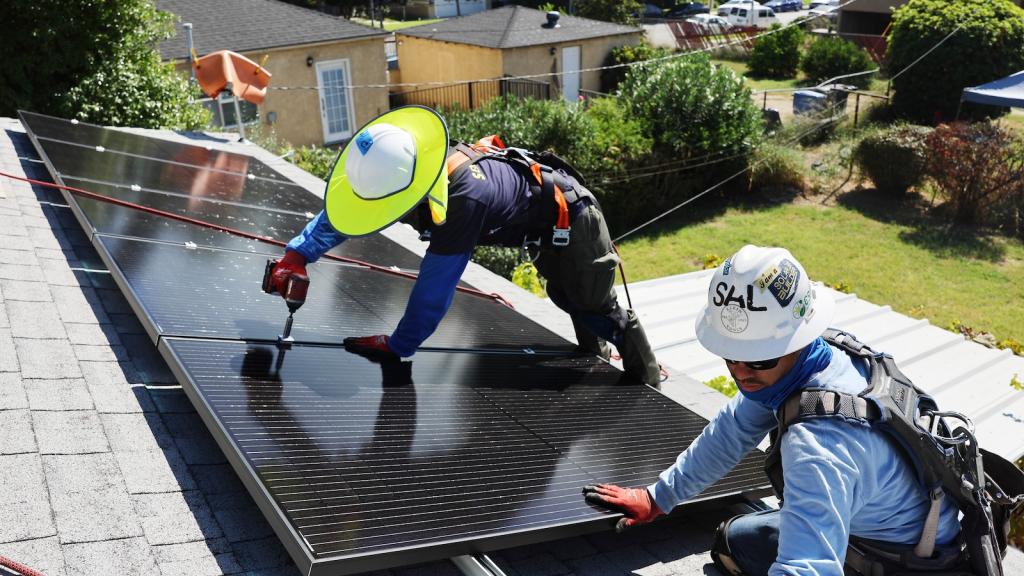Is Burgess a whistle-blower or just a wily businessman?Photo: Steven DepoloCross-posted from The Phoenix Sun.
The charges leveled by a solar industry insider recently were deadly serious.
“Solar panels do not work that well … and few know it,” revealed Ray Burgess, president and CEO of Solar Power Technologies. Writing in AOL Energy on Oct. 7, Burgess appeared to be a reluctant or even heroic truth-teller, airing the solar industry’s dirty laundry with the best of intentions. (Several times while reading the piece, Jerry McGuire’s Mission Statement came to mind.)
Burgess wrote that “if we who love solar and alternative energy do not put our house in order, those who believe solar is some kind of government-funded shell-game will do it for us. This would be a disaster for our country.”
In other words, Burgess is not just a whistle-blower, but a patriot.
Using anecdotes and scientific data, Burgess walks readers through the solar industry’s dismal state of affairs, which can be summed up simply: Photovoltaic panels are crap. They fall apart quickly on their own. Their electrical output is subject to “dozens and dozens” of threats — from bullets to golf balls. (Wait — what about meteorites and chunks of blue ice?) One of his listed threats, dust, is a real concern. But here Burgess establishes a leitmotif for his solar indictment, blowing problems far out of proportion.
“In 2009,” Burgess writes in one anecdote, “Google found that after it cleaned its panels, energy doubled.”
Here’s what the Red, White, and Blue Whistle-blower left out.
“We have two different sets of solar panels on our [Mountain View, Calif.] campus,” Google explained in its official blog,”completely flat ones installed on carports, and rooftop ones that are tilted.” Washing doubled the output of the flat-mounted panels.
But, the blog continued, “The rooftop solar panels are a different story. Our data indicates that rain does a sufficient job of cleaning the tilted solar panels … So for now, we’ll let Mother Nature take care of cleaning our rooftop panels.”
Another fact Burgess fails to mention is that nearly all solar installations are tilted, primarily to capture the most sunlight. Owners of solar panels do need to maintain them for peak performance, but that’s hardly a nasty little secret.
Burgess also calls claims that solar panels lose their ability to convert sunlight into electricity at a rate of just 0.5 percent per year “bogus.” According to the prestigious National Renewable Energy Laboratory (NREL), Burgess writes, panels degrade “as much as 4.5 percent a year. Or more.”
At this point, you don’t need to be an expert to be suspicious, just a competent reader. The phrase “as much as” refers to an upper limit. Tacking on the words “or more” attempts to recast the ceiling as a floor.
In fact, as reporter Anne Paine points out in a balanced story on how solar panels perform over time, NREL found that most panels studied over the last 40 years degraded at a rate under 1 percent per year.
Questioned by Paine in The Tennessean, Burgess back-peddled, admitting that his 4.5 percent claim was “an extreme case.”
The rest of Burgess’ jeremiad continues in this same vein, citing imaginary problems or inflating real ones to absurd proportions.
Burgess’ motive for airing what he called solar’s “nasty little secret” may have something to do with his niche within the industry he claims to love. His company doesn’t actually make solar panels — it makes devices that monitor the performance of solar panels. Just what you’d need if you wanted to know, say, how fast your panels were degrading.
If this were simply about a company cranking up the fear factor to sell more widgets, it wouldn’t be worth writing about. Advertisers prey on consumer fears all the time. But timing is key here. According to a study released this week, the number of jobs in the solar industry grew at a rate of 6.8 percent in the past year — almost 10 times faster than the U.S. economy as a whole. Compare that to employment in the fossil fuels industry, which is expected to shrink by 2 percent in the coming year.
The words of the Saudi oil minister in 1976 could come today from Big Coal and Big Oil: “The big powers are seriously trying to find alternatives to oil by seeking to draw energy from the sun or water. We hope to God they will not succeed quickly because our position in that case will be painful.”
In the recent collapse of solar manufacturer Solyndra, the dirty energy industries see an opening to stave off the pain of competition from renewable, clean energy. They, and the politicians they support, are hoping to use the Solyndra failure as a wedge to bring down the entire renewable energy tree — and dispose of the current administration, which has done a lot to support alternative energy. (Not enough, perhaps, but a lot.)
The Burgess piece provides the kind of ammunition the fossil fuels industry wants, even if the charges aren’t accurate. Once these horror stories are published, they bounce around the internet and are repeated until no one knows whether the figures quoted are right. It’s already happening. The article was the basis for a piece that ran in a Charleston [W. Va] Daily Mail blog under the headline, “Expert: Solar panels don’t work well.“
Whistle-blowers can play a critical role in keeping businesses and governments honest. Sometimes, however, they just blow.



